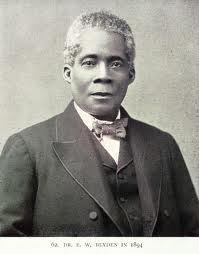|
On August 3rd, 1832 Edward Wilmont-Blyden was born in St. Thomas Danish West Indies, what is now known as the U.S. Virgin Islands. He was the son of parents who were free blacks from the Igbo Tribe in Nigeria. As a studious young man Blyden caught the attention of Reverend John P. Knox who was an American Pastor of the St. Thomas Protestant Dutch Reformed Church. Knox became the mentor of Blyden and encouraged him to polish his oral and writing skills. Impressed by Knox, Blyden choose to follow in his footsteps and became a minister. In 1850 Blyden was joined by the wife of Reverend Knox on a trip to Knox’s Alma Mater the Rutgers Theological College. The college refused to admit Blyden as a student because he was black; he also failed to gain admittance in two other colleges because of his race. Knox encouraged Blyden to move to Liberia which was an upstart colony in Africa, he thought Blyden would be able to use his skills better there. Blyden sailed to Liberia in 1850 and became involved in the development of the colony. Blyden was editor for the Liberia Herald and also wrote his column “A Voice From Bleeding Africa” from 1855 to 1856. He edited for newspapers in Nigeria as well as Sierra Leone, later he edited at The Negro, and The African World. Blyden was acquainted with the American Colonization Society which allowed him to be published in their African Depository and Colonial Journal. In 1861 Blyden became a professor at Liberia College teaching Greek and Latin. In 1880 Blyden was selected as President of Liberia College a position he held until 1884. He also served as Ambassador for Liberia to Britain and France; he also traveled to the U.S. to speak to blacks about what he was doing for Liberia. During his speeches in the U.S., Blyden was offering freedom by way of returning to Africa. His ideas were not received well by African-Americans. Blyden used Ethiopianism a concept inspired by the Zionist movement, built on the belief that if African people returned to Africa our conditions would improve. He would later incorporate the concept of Islam into his ideology, stating that it was a more proper religion for African-Americans and Americo-Liberians. Because of his heavy involvement in the development of Liberia, Blyden was named the Liberian Secretary of State in 1862, and Minister of Interior in 1880. He ran for president in 1885 but lost the race. Blyden became the director of the education of Muslims in Freetown, Sierra Leone from 1901 to 1906. He encouraged as many Africans as possible to choose Islam during this time. Blyden married Sarah Yates while living in Liberia; they had three children while they were together. He would later meet and engage in a relationship with Anna Erskine and they would have five children together. Blyden became known as “The Father of Pan-Africanism” because of his work in Liberia and Sierra Leone and his writings. His best known piece of writing is titled Christianity, Islam and the Negro Race; which he wrote in 1887. This piece helped to promote his ideas of Islam as a better religion for African people. He believed that Christianity had a debilitating effect on the Psyche of African people. His book caused a stir in Britain because of Blydens race and his content. Edward Blyden died on February 7th, 1912 in Freetown, Sierra Leone and was buried at the Racecourse Cemetery. Blyden is credited as the first to spread ideas of Africans around the globe uniting and moving back to Africa to enrich and empower Africa. Though he was met with resistance and racism, Blyden continued his ideas of Africans freeing themselves. He felt that if we have our own place to exit in the world, why would be beg for a place in someone else’s world. Mr. Edward Wilmont-Blyden, we stand on your shoulders. J.A. Ward. Click below to view the Edward Wilmont-Blyden video
0 Comments
Leave a Reply. |
Details
Categories
All
Click Here to join our mailing list
|
Contact Us: |
Connect With Us |
Site powered by PIT Web Design


 RSS Feed
RSS Feed



